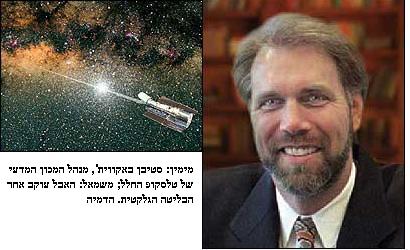If confirmed, the number of known planets around other suns will increase from about 130 to about 230 at once.
Avi Blizovsky

Direct link to this page: https://www.hayadan.org.il/hubble100plantes.html
The Hubble Space Telescope has apparently discovered 100 new planets orbiting stars in our galaxy. Hubble's loot came from a cluster of stars located in the dome-like bulge of the Milky Way. If the discovery is confirmed, it will almost double the number of known planets around other suns, from about 130 to about 230.
The discovery will likely lead to support for the idea that every sun-like star in our galaxy, and possibly the entire universe, is accompanied by planets.
A very significant progress
Stephen Beckwith, director of the Hubble Space Telescope Science Institute, told the BBC: "I believe this work has the potential to become the most significant advance in the discovery of exoplanets since the first discoveries in the mid-XNUMXs.
If indeed this is true, it will be a breakthrough in the field, and it will make Hubble one of the most important instruments in the discovery of new planetary systems.
The new planets were found during a seven-day observation in February commissioned by astronomer Kailish Sahu. Some of the stars observed dimmed the light of the stars they passed by. If indeed this is so, the transit of the planets is responsible for the decrease in the amount of light of the star.
"The discovery of many planets near stars in our galaxy's bulge will clearly demonstrate that systems of planets are extremely common around ordinary stars," Buckwith said. More research is still needed to convince astronomers that they have really found so many planets. "We probably won't be able to publish final findings until the fall, maybe September or October." said Buckwith.
If this is indeed confirmed, then in a week we have doubled the number of planets we have discovered in nine years. Buckwit concluded: "We must confirm the existence of the candidate planets around the bright stars by measuring their radial velocities with ground-based telescopes. This may take a few weeks. It is also necessary to carry out an additional analysis of the Hubble's photos."
Astronomers predict that it will be possible to study from the ground only 10-20 percent of the discovered planets. NASA is looking into ways to perform maintenance on Hubble using an unmanned spacecraft due to a decision made at the beginning of the year in light of the Columbia disaster, according to which it is too dangerous to send astronauts to Hubble via the space shuttle.
For news at the BBC
Know planets outside the solar system
https://www.hayadan.org.il/BuildaGate4/general2/data_card.php?Cat=~~~887438076~~~54&SiteName=hayadan
